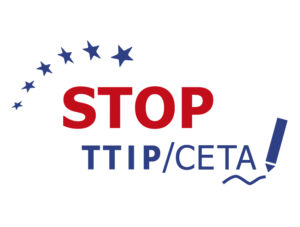Bruxelles scoate statele membre din joc în ceea ce privește acordul de liber schimb CETA
Marțea trecută, președintele Comisiei Europene Juncker a informat clar Țările de Jos că parlamentele naționale ale statelor membre nu se pot exprima în ceea ce privește votul pro sau contra CETA, acordul de liber schimb între UE și Canada. Marianne Thieme a solicitat săptămâna trecută în Camera Inferioară a Parlamentului o dezbatere în Guvern. O majoritate parlamentară a sprijinit această solicitare. Acordul de liber schimb acordă mai multă putere companiilor multinaționale și amenință democrația și standardele privitoare la siguranța produselor alimentare, a vieții private, a bunăstării animalelor și mediului înconjurător. Partidul pentru Animale este împotriva CETA și vrea un referendum. Un astfel de acord de liber schimb amplu trebuie prezentat parlamentelor naționale din UE și cetățenilor lor.

Președintele UE, Juncker, dorește să scoată din joc parlamentele naționale cu privire la aprobarea sau respingerea CETA. Acest acord de liber schimb între UE și Canada nu este doar o amenințare gravă la adresa democrației, bunăstării animalelor, naturii, mediului și fermierilor neerlandezi, dar este, de asemenea, ușa din spate pentru intrarea pe piața europeană a companiilor americane cu filiale în Canada. De aceea este foarte important pentru Partidul pentru Animalele ca Țările de Jos să aibă posibilitatea de a se pronunța liber împotriva CETA. La inițiativa lui Marianne Thieme, Camera Inferioară a Parlamentului va ține după vacanța de vară o dezbatere pe această temă cu ministrul Afacerilor Externe.
Thieme: „În ceea ce îl privește pe Juncker, CETA trebuie să intre cât mai curând posibil în vigoare, fără consultarea în prealabil a cetățenilor sau a parlamentelor în particular sau chiar și fără a aștepta avizul Curții Europene de Justiție! Țările de Jos trebuie să poată spune da sau nu cu privire la CETA. De preferință, într-un referendum, dar cel puțin în Parlament.”
Last Tuesday, the European Commission chairman Juncker informed the Netherlands that the national parliaments of the member states have no say in whether the EU enters the CETA agreement – the free trade agreement between the EU and Canada – or not. Marianne Thieme requested the cabinet for a debate last week. The majority of the Lower House backed this request. The free trade agreement gives more power to multinationals and threatens democracy and standards in the area of food safety, privacy, animal welfare and the environment. The Party for the Animals is against CETA and wants a referendum. Such far-reaching free trade agreement must be brought before the national parliaments in the EU and the EU people.

The EU chairman Juncker wants to sideline national parliaments regarding the approval or rejection of CETA. The free trade agreement between the EU and Canada is not only a serious threat to democracy, animal welfare, nature, the environment and Dutch farmers, but it is also a backdoor to the European market for American companies that have a subsidiary in Canada. For that reason the Party for the Animals believes that it is of the utmost importance that the Netherlands has the possibility to say no to the CETA independently. At the initiative of Marianne Thieme, the Lower House will go into debate about this with the Minister of Foreign Trade after summer recess.
Thieme: “As far as Juncker is concerned, CETA will take effect as soon as possible, without consulting EU citizens or independent parliaments and even without waiting for the advice of the Europe Court of Justice. The Netherlands should be allowed to say yes or no to CETA. Preferably by referendum, but at least in the Lower House.“